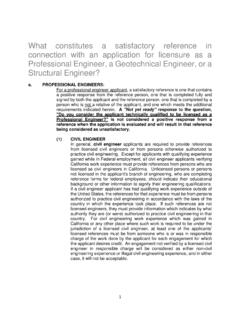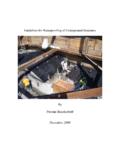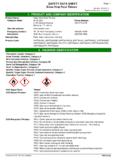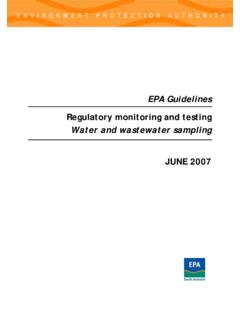Transcription of 2022 Board Rules and Regulations Relating to ... - California
1 Board Rules and Regulations Relating to the Practices of Professional Engineering and Professional Land Surveying California Code of Regulations , Title 16, Division 5 400-476 Article 1. General Provisions 400. Introduction. These Regulations are adopted by the Board in order to implement and make specific the Professional Engineers Act and the Professional Land Surveyors Act, Business and Professions Code Sections 6700, et seq., and 8700, et seq., respectively. 401. Declaratory Decisions. No decision or opinion issued by or on behalf of the Board for Professional Engineers, Land Surveyors, and Geologists shall be considered a declaratory decision pursuant to Government Code section through unless the decision or opinion specifically states that it is a declaratory decision issued pursuant to Government Code sections through 403.
2 Location of Offices. The principal office of the Board is 2535 Capitol Oaks Drive, Suite 300, Sacramento, 95833-2944. All correspondence Relating to the activities of the Board , including applications, renewals, and remittances, shall be directed to the Board s office. 404. Definitions. For the purpose of the Rules and Regulations contained in this chapter, the following terms are defined. No definition contained herein authorizes the practice of engineering as defined in the Professional Engineers Act. (a) ABET means ABET, Inc., formerly known as the Accreditation Board for Engineering and Technology. (b) Agricultural engineering is that branch of professional engineering which requires such education and experience as is necessary to understand and apply engineering principles to the design, construction, and use of specialized equipment, machines structures and materials Relating to the agricultural industry and economy.
3 It requires knowledge of the engineering sciences Relating to physical properties and biological variables of foods and fibers; atmospheric phenomena as they are related to agricultural operations; soil dynamics as related to traction, tillage and plant-soil-water relationships; and human factors relative to safe design and use of agricultural machines. The safe and proper application and use of agricultural chemicals and their effect on the environment are also concerns of the agricultural engineers. The above 2022 PE &PLS Board Rules (16 CCR 400-476) 1 definition of agricultural engineering shall not be construed to permit the practice of civil, electrical or mechanical engineering, nor professional forestry.
4 (c) Approved Cooperative Work-Study Engineering Curriculum refers to any curriculum under an ABET accredited cooperative work-study engineering program. (d) Approved Cooperative Work-Study Land Surveying Curriculum refers to any curriculum under an ABET accredited cooperative work-study surveying program. (e) Approved Engineering Curriculum refers to any curriculum under an ABET accredited engineering program leading to a baccalaureate degree in engineering. (f) Approved Engineering Technology Curriculum refers to any curriculum under an ABET accredited engineering program leading to a four-year degree or a baccalaureate degree in technology. (g) Approved Land Surveying Curriculum refers to any curriculum under an ABET accredited program leading to a baccalaureate degree.
5 (h) Approved Post-Graduate Engineering Curriculum refers to any curriculum under an ABET accredited engineering program leading to a master s degree in engineering or to a post-graduate degree earned from an engineering program where the baccalaureate degree program is accredited by ABET. (i) Board means the Board for Professional Engineers, Land Surveyors, and Geologists. (j) Chemical engineering is that branch of professional engineering which embraces studies or activities Relating to the development and application of processes in which chemical or physical changes of materials are involved. These processes are usually resolved into a coordinated series of unit physical operations and unit chemical processes. It is concerned with the research, design, production, operational, organizational, and economic aspects of the above.
6 The above definition of chemical engineering shall not be construed to permit the practice of civil, electrical or mechanical engineering. (k) Civil engineer refers to a person who holds a valid license in the branch of civil engineering, as defined in Section 6702 of the Code. (l) Civil engineering is that branch of professional engineering as defined in Section 6731 of the Code. (m) Code means the Business and Professions Code. (n) Consulting engineer refers to any professional engineer who holds a valid license under the provisions of the code, or a person who possesses a valid authorization issued pursuant to Section of the Code, or a person who holds a valid exemption from provisions of the chapter as provided for in Sections 6704 and of the Code.
7 (o) Control system engineering is that branch of professional engineering which requires such education and experience as is necessary to understand the science of instrumentation and automatic control of dynamic processes; and requires the ability to apply this knowledge to the planning, development, operation, and evaluation of systems of control so as to insure the safety and practical operability of such processes. The above definition of control system engineering shall not be construed to permit the practice of civil, electrical, or mechanical engineering. (p) Corrosion engineering is that branch of professional engineering which requires such education and experience as is necessary to understand the environmental corrosion behavior of materials; and requires the ability to apply this knowledge by recommending procedures for control, protection and cost effectiveness, resulting from the investigation of 2022 PE & PLS Board Rules (16 CCR 400-476) 2 corrosion causes or theoretical reactions.
8 The above definition of corrosion engineering shall not be construed to permit the practice of civil, electrical, or mechanical engineering. (q) Electrical engineer refers to a person who holds a valid license in the branch of electrical engineering, as defined in Section of the Code. (r) Electrical engineering is that branch of professional engineering as defined in Section of the Code. (s) Engineer-in-training refers to a person who has been granted a certificate as an engineer-in-training in accordance with Section 6756 of the Code. (t) Fire protection engineering is that branch of professional engineering which requires such education and experience as is necessary to understand the engineering problems Relating to the safeguarding of life and property from fire and fire-related hazards; and requires the ability to apply this knowledge to the identification , evaluation, correction, or prevention of present or potential fire and fire related panic hazards in buildings, groups of buildings, or communities, and to recommend the arrangement and use of fire resistant building materials and fire detection and extinguishing systems, devices, and apparatus in order to protect life and property.
9 The above definition of fire protection engineering shall not be construed to permit the practice of civil, electrical, or mechanical engineering. (u) For the sole purpose of investigating complaints and making findings thereon under Sections 6775 and 8780 of the Code, incompetence as used in Sections 6775 and 8780 of the Code is defined as the lack of knowledge or ability in discharging professional obligations as a professional engineer or land surveyor. (v) Industrial engineering is that branch of professional engineering which requires such education and experience as is necessary to investigate, to design, and to evaluate systems of persons, materials and facilities for the purpose of economical and efficient production, use, and distribution.
10 It requires the application of specialized engineering knowledge of the mathematical and physical sciences, together with the principles and methods of engineering analysis and design to specify, predict, and to evaluate the results to be obtained from such systems. The above definition of industrial engineering shall not be construed to permit the practice of civil, electrical, or mechanical engineering. (w) Land surveying is that practice defined in Section 8726 of the Code. (x) Land surveyor refers to a person who holds a valid license as a land surveyor, as defined in Section 8701 of the Code. (y) Land surveyor-in-training refers to a person who has been granted a certificate as a land surveyor-in-training in accordance with Section 8747 (a) of the Code.









